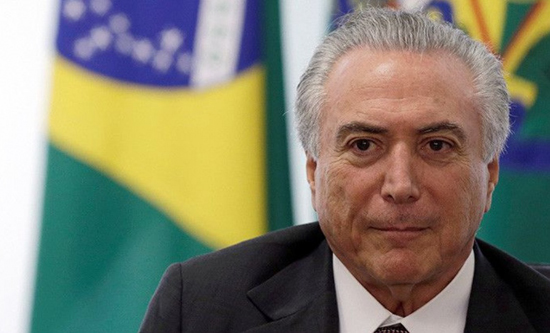
On 14 September Brazil’s prosecutor general’s office laid new charges of bribery against President Michel Temer and six other leading politicians from his Brazilian Democratic Movement Party, involving $188m. Three are already in jail. Temer and two other men are further accused of obstructing justice. The day before, the prosecutor general Rodrigo Janot survived a challenge in the Supreme Court to remove him from leading the Temer investigations. Temer is now accused of having acted as the leader of a criminal organisationsince May 2016. Denying all charges, Temer publically insulted Janot as a personal failure, and has shamelessly ploughed on with his scheme to plunder the country.
This is the second set of charges Temer has faced this year. The first set, that he had accepted charging bribes of $12m from the meat-packing giant JBS, were put aside on 2 August after Congress blocked his trial. Temer has lost six ministers in scandals in his first six months of office, and investigations were opened into eight more earlier this year. Over one third of Congress members are currently under investigation for various crimes of corruption. To escape trial, Temer resorted to agreeing $1.33bn funding for projects in Congress members’ own states, simple legal bribery.
It is hardly likely that another vote in Congress will see him tried by the Supreme Court for these second charges, since a two thirds majority is required, and Temer has more than a third of the votes in his pocket.
Selling Brazil’s public property
Temer’s sweeping privatisation plan listing 57 assets worth R$44bn ($14.7bn) aims to sell everything from highways, ports, airport concessions to the state-run bank’s lottery unit, in order to raise cash and boost private infrastructure investment. GDP has shrunk by 7.4% in the past two years, reducing tax revenues. The state budget deficit is now over 9% of GDP, so the government is opening up more sectors to foreign investors. On 22 August, the government said it would sell some of the state’s 41% stake in Eletrobras, Latin America’s biggest electricity generator.
The government has also announced a new market for debts to finance infrastructure. It has made the state development bank, BNDES, set its standard lending rate on the five-year Treasury rate from January 2018 onwards. This removes the interest rate subsidy previously provided to its borrowers and so will shift borrowing to private banks.
Already many workers’ rights have been removed in advance of the forthcoming cut in Brazil’s pensions.
Selling Brazil’s environment
On 27 June 2017 Norway told Brazil that if rising deforestation in the Amazon rainforest is not reversed, its billion-dollar financial assistance will fall to zero. It has provided $1.1bn to Brazil’s Amazon fund since 2008, to reduce forest destruction. This destruction fell steadily from 2008 to 2014, but has risen again. Annual deforestation in the Brazilian Amazon jumped by 29% to 8,000 sq km in 2016, 500 sq km short of Norway’s payments boundary. On 23 August came shocking news that Temer had issued a decree abolishing the protected status of 4.5 million hectares (4,500 sq km or the size of Denmark) of the northern Amazon forest, bordering French Guiana, Suriname and the Atlantic. This covers the Wayapí and Wayana-Apalai reserves and eight ‘conservation’ units. The reserves were legally secured by 1996. The Wayapí reserve is an estimated 6,000 sq km. However this is part of the pre-existing larger ‘Reserva Nacional de Cobre e Associados’ (Renca – National Copper Reserve), established by the military dictatorship in 1984 to secure possession of minerals in the area and make sure that the government controlled their extraction. The military dictatorship collapsed in 1985 and Renca was forgotten. Now Temer wants to realise the dictatorship’s mining ambitions.
On 30 August a federal judge ruled that Temer overstepped his authority in issuing a decree to abolish protection of an area of 46,000 sq km that has been protected since 1984. This may be only a temporary reprieve for the area, which contains deposits of gold, copper, tantalum, iron ore, nickel and manganese.
Personally, Temer’s concessions to wealthy agribusiness interests and to mining and other extractive industries are part of his deals with Congressional groups (essentially the powerful ‘ruralistas’ who now control more than half of Brazil’s Congress) to stay in office. Objectively they reflect the ever growing and blind desperation of capital to plunder nature irrespective of its global consequences.
The 2018 elections
The next Brazilian general elections take place in October 2018, to elect the President and Vice President, the National Congress, state Governors and Vice Governors and state Legislative Assemblies. The mass of the workers simply do not trust the politicians now in government. Lula da Silva, the Workers Party founder and ex-state president, is conducting an intense campaign based on caring for the poor. ‘The poorest know what we did for them,’ he said. ‘It’s the only thing that makes sense for a government, to take care of the poorest.’ Lula is already appealing against a sentence of nine years six months pronounced in July for corruption. If his appeal fails he will be unable to stand in the election. The human rights lawyer Geoffrey Robertson has taken his case to the United Nations Human Rights Committee.
In September, Lula, Dilma Rousseff and other leaders of the Workers Party were charged with channelling $470m in bribes to the Party from 2002 to 2016. Lula and Rousseff argue that they are subject to a politically motivated legal campaign to stop Lula running.
The Machiavellian scheming, so long the mark of the morally bankrupt but wealthy Brazilian ruling class, will continue to block any progressive step in the Congressional field, and only the determined organised actions of the masses will be able to force a change in this ghastly chain of theft and plunder of the workers and landless peasants, and of nature itself.
Alvaro Michaels




